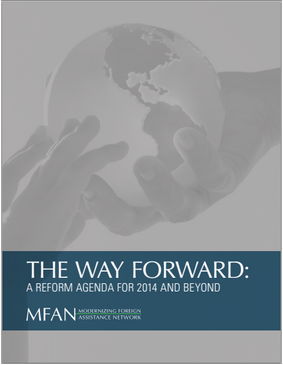
Putting the spotlight on the newly elected US Congress and foreign assistance discussions in 2015. (Courtesy photo: Amanda Wills. Mashable’s #LegoSenate November 2014 election coverage)
This January, a newly elected U.S. Congress takes the stage and brings up the question of how this will shape U.S. foreign assistance discussions in 2015. The US Global Leadership Coalition’s Liz Schayer has argued that there is a consensus from both sides of the aisle that aid accountability and transparency will continue to be an emphasis moving forward.
However, often when discussing foreign assistance, we assume that in order to maximize the effectiveness of the aid that is provided, efforts need to focus on the recipient end of the spectrum: monitoring what countries do with the aid money, ensuring local ownership of the aid process, aligning aid with governmental strategies and objectives and so forth. While this is incredibly important in establishing effective and sustainable foreign assistance practices, there is a key element that sometimes gets overlooked in this process: the accountability donors have to their own governments and citizens.
A few steps forward for transparent US foreign assistance
2010 was a pivotal year for the U.S. in assuring both citizens at home and abroad that the U.S. is committed to furthering transparency and accountability regarding its foreign aid practices. President Barack Obama signed the first ever presidential decree on foreign assistance – the Presidential Policy Directive on Global Development – and catalyzed several government initiatives to better track, monitor, and report US foreign assistance abroad. These include initiatives such as the development of the Foreign Assistance Dashboard, joining the International Aid Transparency Initiative, and several proposed Congressional bills to institutionally mandate and oversee these commitments.
With this invigorated governmental effort to better track the allocation and impact of U.S. foreign assistance, there has also been an uptake over the last few years in the wider community of interested stakeholders to hold the U.S. government accountable to these proposed ideas and methods. This “internal” / domestic accountability is not just a means to track where taxpayer money is going – it can also help to spearhead and accelerate better practices abroad by ensuring that money is spent both effectively and efficiently.
Organizations like Oxfam America educate the public about the importance of foreign aid and how little of the US federal budget is actually devoted to foreign assistance. Oxfam is just one example of many organizations seeking to mobilize interest on the part of the US public regarding various pieces of legislation such as the Foreign Aid Transparency and Accountability Act of 2013. With similarly titled bills in review in both the House and Senate, the discussion around these bills has been notably non-partisan: both bills were co-introduced by both a Democrat and Republican respectively and support for both bills revolves around issues, such as accountability and transparency, which transcend party lines.
In addition, the Modernizing Foreign Assistance Network (MFAN) published their reform agenda earlier this year – The Way Forward: A Reform Agenda for 2014 and Beyond – which emphasizes accountability and country ownership to make US aid more effective abroad.
Where do we go from here: accountability and country ownership in context

The Modernizing Foreign Assistance Network argues that accountability and country ownership are the “perfect pair” of pillars to drive foreign assistance discussions in 2015 and beyond.
With aid effectiveness increasingly entering U.S. discussions on improving aid practices, how can the U.S. advance the impact and effectiveness of its aid efforts abroad? MFAN calls for more transparency, evaluation, and learning to help the U.S. to achieve better results and lead the charge on global standards. “As a global standard-bearer and the world’s single largest donor, the U.S. should lead reforms in policy and innovations in practice to catalyze change and achieve sustainable results” (MFAN Reform Proposal, pg. 2). In addition, MFAN recognizes that efforts to embrace accountability, without concurrently helping to improve government ownership of development in their own countries, will be futile for ensuring sustainability in the long-term. Country ownership is equally, if not more, vital for the long-term effectiveness of US development assistance efforts abroad.
But what do these pillars of country ownership and accountability look like in practice? Earlier this year, AidData participated in discussions with the Modernizing Foreign Assistance Network, the Congressional Caucus on Effective Foreign Assistance and the RESULTS network to place these principles into context with concrete examples of how country ownership and accountability are being realized in countries such as Nepal and Uganda, among others.
One early-stage example has been AidData’s collaboration with the U.S. Global Development Lab and seven partner country governments to make aid information more transparent by helping to visualize the answers to questions such as, “who is doing what and where?” As more hyper-local information on funding for development becomes publicly available, this data serves as a public good for citizens in the US and abroad to use it to hold their governments accountable for results.
By being built upon the foundation of country-owned aid information systems, such as the Aid Management Platform, these transparency efforts have a greater likelihood of being sustained as well as having the information used by domestic audiences. We count it as a good sign that governments continue to request geocoded data from their respective donor partners and post this data on funded development projects publicly. The relevance of this information for decision-making is seen in the incorporation of geocoded data in various governmental publications around the world, such as Timor-Leste’s annual Development Cooperation Report.
Despite these promising steps forward, there is still a need to further develop capacity, within governments, donors and civil society at home and abroad. Greater data literacy is critical if more people are to be able to follow the money for themselves and if this information is to truly strengthen accountability, ownership and, ultimately, the effectiveness of aid. AidData’s efforts to embed data fellows within government and civil society to provide basic data literacy training is but one practical contribution to address this challenge. Nonetheless, more efforts like such are needed.
As the newly elected US Congress opens session this week, I hope that country ownership and accountability are at the forefront of foreign assistance discussions. Last year was a pivotal year in US accountability with the enactment of the Assessing Progress in Haiti Act of 2014, which puts more calls for more stringent reporting, and consequently accountability, regarding US Government-funded post-earthquake recovery work in Haiti. Liberating more and better data on development resources and results is an important step forward. However, we collectively need to continue to invest in practical ways in which data can be turned into action, whether for evidence-based resource allocation, discussions around development priorities or for monitoring government performance.
